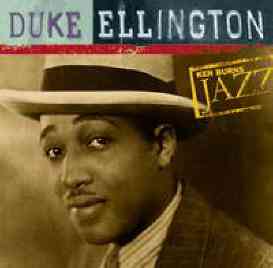Home
Blog
Composers
Musicians
Black History
Audio
About Us
Links
Composers:
Adams, H. Leslie
Akpabot, Samuel Ekpe
Alberga, Eleanor
Bonds, Margaret Allison
Brouwer, Leo
Burleigh, Henry Thacker
Coleridge-Taylor, Samuel
Cunningham, Arthur
Dawson, William Levi
Dede, Edmund
Dett, R. Nathaniel
Elie, Justin
Ellington, Edward K. "Duke"
Euba, Akin
Garcia, José Mauricio Nunes
Hailstork, Adolphus C.
Holland, Justin
Jeanty, Occide
Johnson, James Price
Joplin, Scott
Kay, Ulysses Simpson
Khumalo, Mzilikazi
Lambert, Charles Lucien, Sr.
Lambert, Lucien-Leon G., Jr.
Lamothe, Ludovic
Leon, Tania
Moerane, Michael Mosoeu
Perkinson, Coleridge-Taylor
Pradel, Alain Pierre
Price, Florence Beatrice Smith
Racine, Julio
Roldan, Amadeo
Saint-Georges, Le Chevalier de
Sancho, Ignatius
Smith, Hale
Smith, Irene Britton
Sowande, Fela
Still, William Grant
Walker, George Theophilus
White, José Silvestre
Williams. Julius Penson
AfriClassical Blog
Companion to AfriClassical.com
Guest Book
William J. Zick, Webmaster,
wzick@ameritech.net
© Copyright 2006 - 2022
William J. Zick
All rights reserved for all content of AfriClassical.com
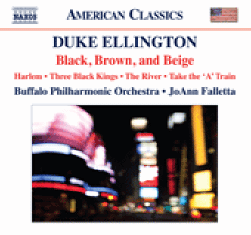
Duke Ellington
Black, Brown, and Beige
Buffalo Philharmonic Orchestra
JoAnn Falletta, Conductor
Naxos 8.559737 (2013)
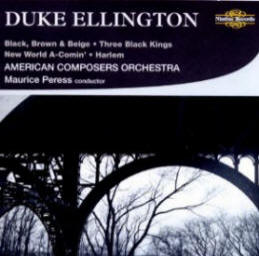
Duke Ellington
Four Symphonic Works
American Composers Orchestra
Maurice Peress, Conductor
Nimbus 25 11 (2008)
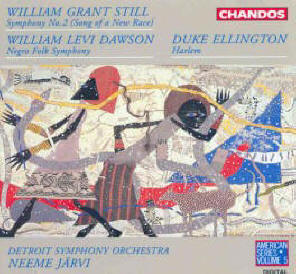
Harlem
Detroit Symphony Orchestra
Neeme Järvi,
Conductor
Chandos 9226 (1993)
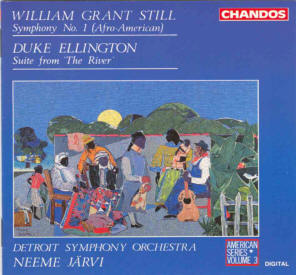
Suite from 'The River'
Detroit Symphony Orchestra
Neeme Järvi, Conductor
Chandos 9154 (1993)
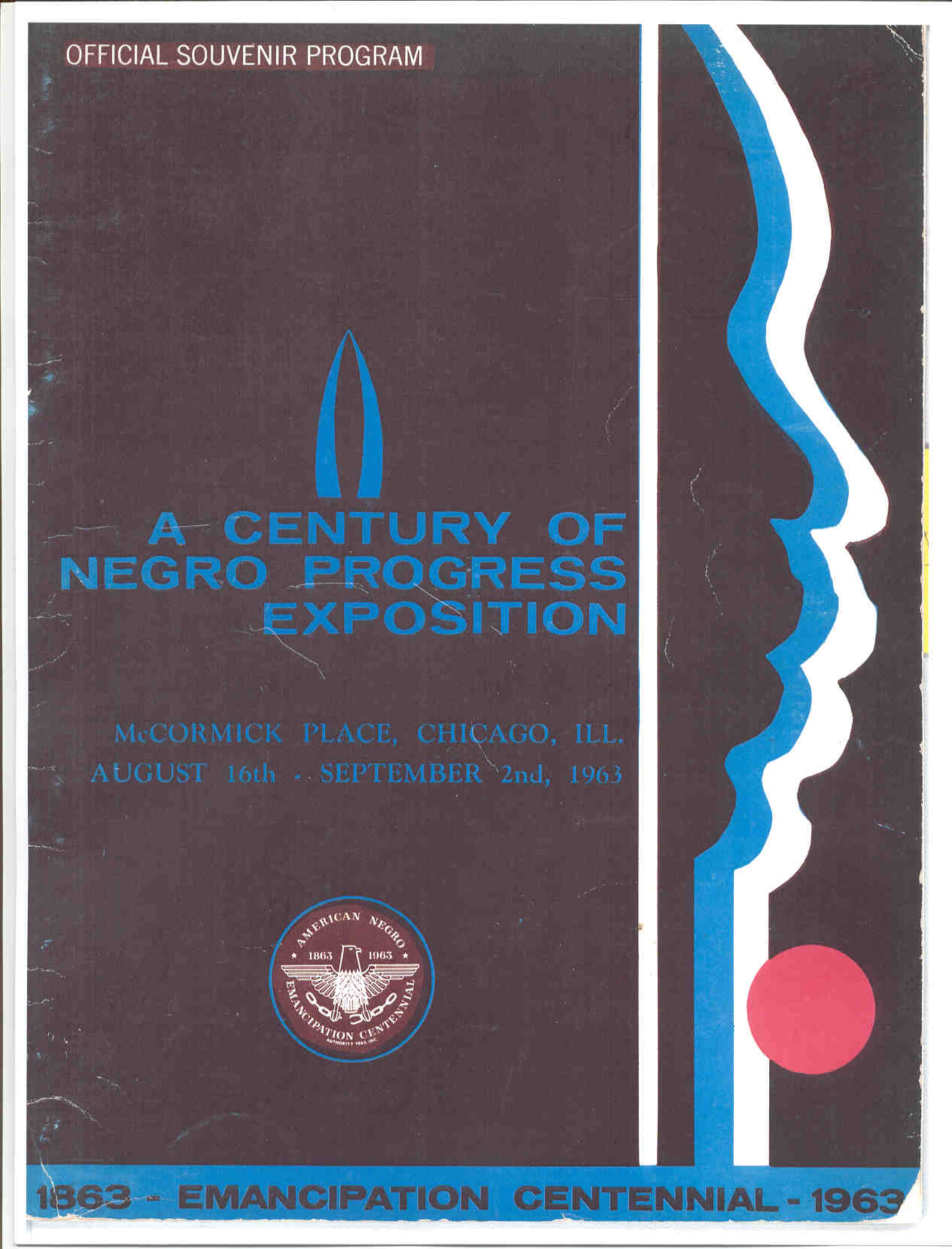
“A Century of Negro Progress
Exposition," McCormick Place, Chicago, Ill., August 16th – September
2nd, 1963. Photo from Barbara Wright-Pryor
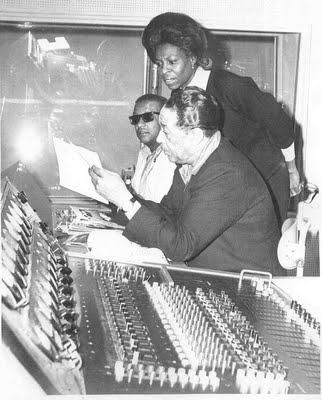
Duke Ellington, Billy Strayhorn and
vocalist Lil Greenwood (Photo from 1963 musical revue My People
provided by Barbara Wright-Pryor)
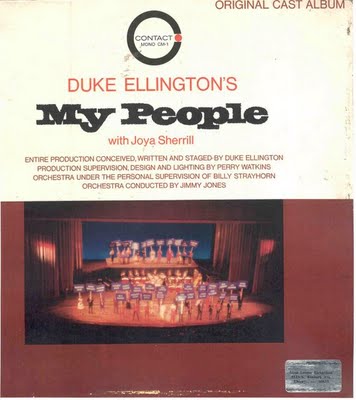
Duke
Ellington's My People
Original Cast Album
Contact Records
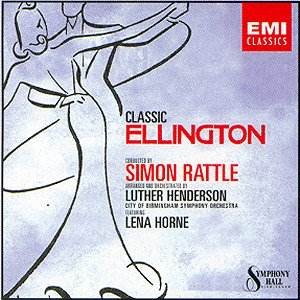
Classic Ellington
City of Birmingham Symphony Orchestra
Simon Rattle, conductor
EMI 5 57014 2 (1999)
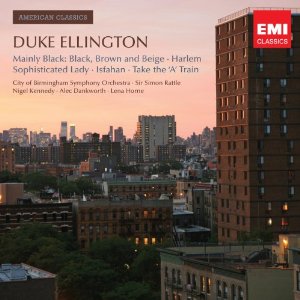
Duke Ellington Mainly Black: Black,
Brown and Beige - Harlem - Sophisticated Lady - Isfahan - Take the
'A' Train
City of Birmingham Symphony Orchestra; Sir Simon Rattle
Nigel Kennedy, violin
Alec Danworth, double bass
Lena Horne, voice
EMI Classics 41119 (2010)
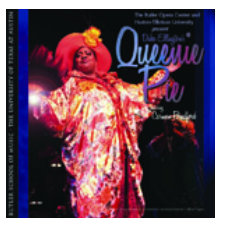
Queenie Pie
Longhorn Records (2010)
University of Texas at Austin |
Home ->
Composers -> Ellington, Edward
Kennedy "Duke"
Français
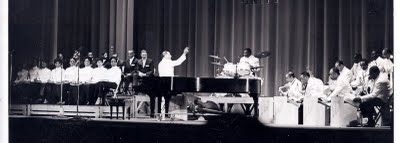
November 1968 performance of Duke
Ellington's Sacred Concert at Chicago's Auditorium
Theater.
Photo from Barbara Wright-Pryor, who says: "I was Duke's choral
director and am seated in the first row, fifth from right.”
1 Birth
Edward Kennedy "Duke" Ellington was an African American
composer, pianist and jazz band leader. He was born into a
middle-class family in Washington, D.C. on April 29, 1899. James
Clyde Sellman writes in Africana Encyclopedia:
|
For nearly half a century Duke Ellington led the premier
American big band, and through his compositions and
performances he brought artistic credibility to African American
jazz. Ellington played the piano, but his orchestra was his true
instrument. |
2 Classical
Music
Although best known for composing, leading and performing about
2,000 "big band" jazz pieces, Ellington also composed
orchestral, chamber and solo piano works in the classical genre. His classical music has gradually gained new listeners in recent
years due to recordings which are the focus of this Web page.
3 Early Years
Young Edward began studying the piano at age seven. He was about
17 years old when he began playing piano professionally. By age
20 he was a bandleader, playing at social events. In 1922
Ellington moved to New York City, where he played with both
theater orchestras and jazz bands. His first Broadway score was
for a 1924 musical Chocolate Kiddies, a show which did not fare
well. Also in 1924, Ellington became the leader of a six-member
jazz band previously known as the Elmer Snowden Band. Within two
years the Ellington Orchestra had eleven musicians in its ranks.
4 Cotton Club
Africana Encyclopedia recounts Ellington's association with the
Cotton Club in Harlem:
|
In the fall of 1927 the Ellington orchestra secured a long-term
gig at
the Cotton Club, New York City's most prestigious nightclub,
which
was wired to permit "live" remote radio broadcasts that gave
Ellington nationwide recognition. |
In keeping with the times, the Cotton Club was racially
segregated. Only whites were admitted as patrons; all of the
waiters and most of the entertainers were African American. During the engagement at the Cotton Club the band was called the
Cotton Club Orchestra.
5 Style
Ellington established the distinctive style of his orchestra
with a series of recordings in 1927-28. The songs were timed to
fit 78 r.p.m. records, which could only record about three
minutes per side. The titles included Ellington's 1928
composition Black Beauty and became an enduring part of the
orchestra's repertoire. The ensemble gained additional national
publicity from its performance in the 1930 film Check and Double
Check. Ellington's first longer recording was of his composition
Creole Rhapsody. It was 8 1/2 minutes long and took up two sides
of a 78 r.p.m. record. Africana Encyclopedia adds:
|
In the mid-1930s Ellington wrote the score for a nine-minute
musical film, Symphony in Black (1935), which featured a young
Billie Holiday and foreshadowed Black, Brown, and Beige. |
Ellington and his orchestra toured the U.S. frequently during
the 1930s and enjoyed success in Europe during tours there in
1933 and 1939. In 1938 the orchestra took on Billy Strayhorn,
who would be Ellington's closest collaborator for the next 30
years.
6 Carnegie Hall
In 1943 Ellington and his orchestra performed at New York's legendary Carnegie Hall. The program
included a ground-breaking 44-minute work entitled Black, Brown,
and Beige: A Tone Parallel to the History of the American Negro.
The work did not fit the conventions of either jazz or classical
music, and the response of music critics was so disappointing
that Ellington never again performed the entire piece in public. However, Africana Encyclopedia notes:
|
Neither Ellington nor Strayhorn were dissuaded from creating
other
large-scale jazz suites, including the Liberian Suite (1947);
Harlem
(1951); the Festival Suite (1956); Such Sweet Thunder (1957), a
musical tribute to Shakespeare; Suite Thursday ( 1960), which
paid
tribute to author John Steinbeck; and the Far East Suite
(1966).
Ellington also composed film scores for Anatomy of a Murder
(1959)
and Paris Blues (1961).
|
7
Don Shirley
Don Shirley is an African
American pianist who was born in Kingston, Jamaica in 1927 and
died in 2013. He
was best known for his jazz performances and recordings, but he
was classically trained and had a noteworthy classical career.
Duke Ellington heard him play at Basin Street in New York.
In 1955 Don
Shirley was piano soloist for music of Ellington at Carnegie
Hall, in a concert of the Symphony of the Air. His
obituary by Bruce Weber in
The New York Times was
Donald Shirley, a Pianist With His Own Genre, Dies at 86.
It was published April 28, 2013:
|
Still,
he was close to many well-known jazz figures, including
Duke Ellington, in whose honor he wrote “Divertimento
for Duke by Don,” a symphonic work that had its premiere
in 1974, performed by the Hamilton Philharmonic
Orchestra of Ontario. |
8 Civil Rights
Ellington participated in the
Civil Rights movement from the 1940s on. In 1941 he wrote the
score for the musical
Jump for Joy,
a show intended to debunk common movie stereotypes of African
American popular culture. During the Carnegie Hall premier of
Black, Brown, and Beige
he told the audience of society figures that people of all
colors were backing the war effort to defend the red, white and
blue.
9 Sacred Concerts
Ellington began exploring spiritual themes with his
Concert of
Sacred Music in 1965. Africana Encyclopedia says of the work:
|
In the Beginning, God, Ellington's opening movement, won a 1966
Grammy Award for best original jazz composition. In 1968
Ellington
composed a Second Sacred Concert. At the time of his death he
was
preparing a third. |
Barbara Wright-Pryor
was choral director for the
November 1968 performance of
Ellington's Sacred
Concert at Chicago's
Auditorium Theater.
10
John Coltrane
During Ellington's final years he and the orchestra maintained a
heavy schedule of one-night stands even as he recorded in small
groupings with such jazz artists as Charles Mingus and Max
Roach. One notable recording in 1962 was
Duke Ellington and
John Coltrane.
11 My People
Barbara
Wright-Pryor, President, Chicago Music Association, worked with
Ellington twice and says of him:
|
Duke composed
My People
for Abraham Lincoln's Emancipation Proclamation
Centennial Celebration 'A Century of Negro Progress
Exposition' and the elaborate production ran from August
16 to September 2, 1963 in the Arie Crown Theater at
Chicago's McCormick Place.
...
In 1963, Robert Morris was a young undergraduate music
major at DePaul University's School of Music and a
member of the Irving Bunton Singers. Duke appointed him
arranger for all of the choral music for
My People.
...
My
People
was being performed in Chicago...when the historic March
on Washington took place August 28, 1963 during which
Dr. Martin Luther King, Jr. gave the legendary "I Have a
Dream" speech. |
12 Revue Revived
Ms. Wright-Pryor recalled her
involvement in the 1963 revival of the musical My People:
|
In May, 1998, twenty-four
years after his death, I was privileged to re-create, produce
and restage his 1963 musical revue,
My People,
at Chicago's New Regal Theater with his granddaughter Mercedes
Ellington as stage director and choreographer, and Dr. Robert L.
Morris, founder/conductor the Leigh Morris Chorale of
Minneapolis, MN, as choral director for the 16th International
Duke Ellington Conference that was held in Chicago. |
13 Final Years
On the occasion of his
70th birthday party in 1969 he was given the Medal of Freedom by
President Richard Nixon. In 1973 Ellington was diagnosed with
lung cancer. Barbara Wright-Pryor says:
|
During the final
stages of his bout with lung cancer, Duke was
hospitalized at Sloan-Kettering Cancer Center in NYC and
had a keyboard in his room on which he continued to
compose and play daily until too ill to do so. |
Ellington
passed away in New York City on May 24, 1974.
14 New World a-Comin'
Ellington's New World a-Comin' (10:18) has been recorded by
pianist Marco Fumo on the Italian music label Dynamic CDS 351
(2000) along with music by George
Gershwin, James Price Johnson, Scott Joplin and William Grant
Still. The liner notes give this description of the work:
|
[O]ne of the most admired works by the mature Ellington, that of
the great "suites". As a matter of fact, this work is more like
a
compact symphonic poem of literary inspiration, which Duke
composed in 1943 and performed often and in various versions;
for
solo piano, with jazz orchestra or symphony orchestra. Every
time,
he played it in a slightly different way, ending up inserting it
in his
First Sacred Concerto, to which it contributed, as an English
critic
in the 1930s once said, its "prophetic breath". This work
beautifully
blends a noble inspiration and the graceful humour of everyday
life. |
Pianist Willis Delony has also recorded New World a-Comin', on
Centaur CRC 2468 (2000).
15 Detroit Symphony
The Detroit Symphony Orchestra, led by Neeme Järvi, Conductor,
has recorded three of Ellington's works for symphony orchestra
on CDs released by the British label Chandos. Harlem,
Suite from "The River" and Solitude are found on Chandos 9909 (2001).
Suite
from "The River" also appears on an earlier disc, Chandos 9154
(1993). Harlem is also found on Chandos 9226 (1993).
16 The River
Michael
Fleming provides some background for Ellington's writing of
Suite from "The River" in the liner notes of Chandos 9154:
|
His son, Mercer Ellington, recalls that "the idea for The River
had
been kicking around for several years, ever since Stanley Dance
had suggested an extended work depicting the natural course of a
river". The elder Ellington composed the music for The River in
1970, during the same period of time when The New Orleans
Suite was taking shape. |
Michael Fleming
tells us that when The River had its premier in 1971,
Clive Barnes lauded it in The New York Times as:
| ...the most
considerable piece from Mr. Ellington since his Black,
Brown and Beige Suite. |
17
Simon Rattle
The website of
www.emiclassics.com
quotes Simon Rattle discussing the concept of the CD Classic Duke Ellington:
|
When I approached Luther about the project, I had little idea
that I
was, in fact, asking him to do what he and The Duke had
discussed
many years earlier but had never brought to fruition – an
orchestral
setting of his work with jazz soloists where the orchestra was a
living organic equal partner rather than a magnificent back-up.
The beauty and power of the arrangements exceeded our wildest
dreams. |
The roster of personnel reads: Simon Rattle, conductor; Lena
Horne, vocals; Clark Terry, trumpet; Bobby Watson, alto sax;
Joshua Redman, tenor sax; Joe Lovano, tenor sax; Regina Carter,
violin; Geri Allen, piano; Lewis Nash, drums; Peter Washington,
bass; City of Birmingham Symphony Orchestra. Tracks include:
Take The "A" Train, You're the one, Sophisticated Lady, Harlem, Isfahan, Ad lib on nippon, That doo-wah thing, Something to live
for, Come Sunday, Solitude in Transblucency, Maybe and Things ain't what they used to be.
18 Symphonic Works
Maurice Peress conducts the American Composers Orchestra on the
CD Four Symphonic Works by Duke Ellington, Music Masters Jazz
7011 (1992). The program begins with Black, Brown and Beige
Suite (20:09), comprised of Work Song, Come Sunday
and Light.
The second work is Three Black Kings (19:16), which includes
King of the Magi, Solomon and Martin Luther King. Next comes
New
World a-Comin' (13:55), followed by Harlem, For Jazz Band and
Orchestra (15:19). Personnel are: Frank Wess, alto saxophone; Richard Chamberlain, trombone; Jimmy Heath, tenor and soprano
saxophones; Roland Hanna, piano; Stephen Hart, clarinet; Jon Faddis, trumpet; Bill Easley, clarinet; Ron Carter, bass; and
Butch Miles, drums.
19 Piano Four
Hands
Duo Campion-Vachon (the Campion-Vachon
duo) is made up of two classical and jazz pianists from Quebec.
Duke Ellington: Piano Four Hands is their recording
on the Canadian label Analekta AN 2 9820 (2005).
Analekta's website,
www.analekta.com, gives this description of the disc:
|
Some thirty years after his death, Duke Ellington - pianist, composer, arranger,
and bandleader - remains one of jazz's
most enduring legends. A great many
of his works, like the ones on this
recording arranged for piano four-hands,
have become jazz standards, pieces that
successive generations of jazz musicians
assimilate and remake in their own image
or interpret as faithfully as possible to the originals. |
20 Queenie Pie
The Chicago Opera Theater announced on May 17, 2013 that it
would produce Duke Ellington's only opera, Queenie Pie:
|
Interested in the opera genre since the 1940s, Ellington
started composing Queenie Pie in 1962, when he
received a commission from the New York public TV
station WNET. In collaboration with librettist Betty
McGettigan, he worked on the opera from 1967 to his
death in 1974, but the work remained unfinished.
...
COT performs the version that librettist McGettigan
created for the Butler Opera Center at the University of
Texas at Austin in 2009, proclaiming it to be the
closest to Ellington's original vision. |
21 Resources
Duke Ellington (www.dukeellington.com)
- Official site maintained by CMG Music. Includes
biography, photos and quotes by and about Ellington.
Wikipedia (http://en.wikipedia.org/wiki/Duke_Ellington) -
Wikipedia article with photographs, biographical and
musicological details, OCG audio samples, and Internet
references to related topics and people.
Duke Ellington Panorama
(www.depanorama.net) - Project of the Washington, D.C.
Ellington Society. List of compositions, sessions, information
on joining other societies and Love You Madly, an e-mail
discussion group, glossary, time line, centennial remembrances.
Ellington on the Web (http://ellingtonweb.ca) - An extensive compilation of websites
related to Duke Ellington and his Associates.
The Duke Ellington Society (http://museum.media.org/duke) - Official site. Includes
biographical information plus appreciation, his interpreters,
sound clips, information about the society, links.
Schirmer.com (www.schirmer.com/composers/ellington_bio.html) - Biography, works, selected
discography, articles, links.
This page was last updated on March 5, 2022
|











